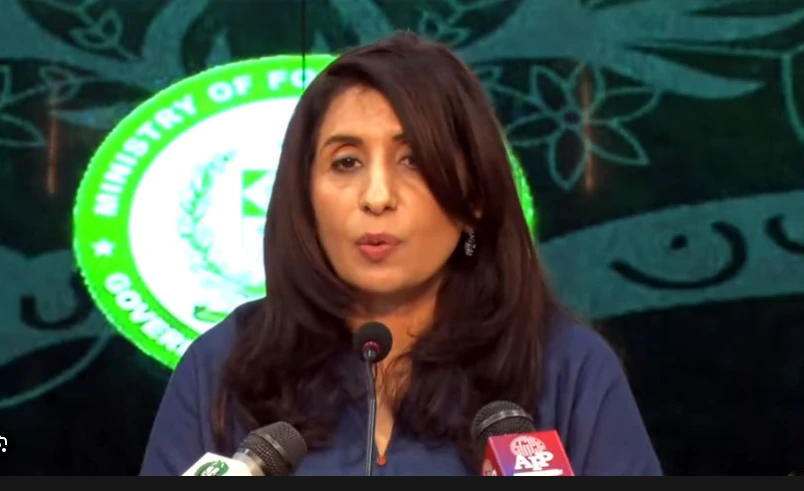No back-channel diplomacy going on between Pakistan, India: FO

Stay tuned with 24 News HD Android App

Prime Minister Shehbaz Sharif is scheduled to attend a special meeting of the World Economic Forum on “Global Collaboration, Growth and Energy for Development” in Riyadh on April 28-29.
Foreign Office spokesperson Mumtaz Zahra Baloch, in her weekly press briefing, told the media that the prime minister, accompanied by Foreign Minister Senator Ishaq Dar, would travel to the Kingdom at the invitation of Saudi Crown Prince and Prime Minister Mohammed bin Salman and WEF Founder and Executive Chairman Klaus Schwab.
She said that the high-level participation in the Forum would provide an opportunity to highlight Pakistan’s priorities in global health architecture, inclusive growth, regional collaboration and balance between growth and energy consumption, besides interacting with the participating world leaders and heads of international orgnisations.
The prime minister will visit Gambia to attend the 15th session of the Islamic Summit Conference under the slogan “Enhancing Unity and Solidarity through Dialogue for Sustainable Development,” on May 4-5, 2024 in Banjul, the capital city of Gambia.
The OIC summit is being held at a critical time when the Israeli atrocities in Gaza continued unabated where the Muslim world leaders will deliberate on the situation in Palestine. She said that Prime Minister Shehbaz would express Pakistan’s grave concern on genocide in Gaza, advocate for their right to self-determination, the imperative of solidarity, besides deliberating on Islamophobia, terrorism, and the challenges faced by the world, particularly the Muslim world.
The prime minister will also hold bilateral meetings with the Muslim world leaders.
The OIC Summit will be preceded by the preparatory meeting of the Council of Foreign Ministers on May 2-3 to be attended by Foreign Minister Dar, who will also hold bilateral meetings.
The spokesperson told the media that Pakistan was witnessing a surge in provocative statements from the Indian leaders asserting unwarranted claims on the Indian Illegally Occupied Jammu and Kashmir (IIOJK). Pakistan rejects the Indian claims as fueled by hyper-nationalism with inflammation rhetoric, such claims pose threats to regional peace and stability.
She urged the Indian politicians to cease the practice of dragging Pakistan into their internal discourse aimed at gaining electoral motives.
She said that despite Indian rhetoric and assertions, IIOJK remained an internationally recognized disputed territory as the UN Security Council’s resolutions clearly outlined that final status would be determined by the will of the Kashmiri people through a free plebiscite.
“India would be wise to help implement those resolutions instead of harboring delusion of grandeur,” she remarked.
The spokesperson also condemned the ongoing vilification, stigmatization and victimization of Muslims and other minorities in India.
To a question, Spokesperson Baloch said currently, there was no back-channel diplomacy going on between Pakistan and India to normalize bilateral trade.
Apprising the media of the visit of Iranian President Ebrahim Raisi, she said during the interactions, both sides agreed to strengthen economic and cultural cooperation, turn the bilateral borders into borders of peace and cooperation, fast-track the negotiations on Free Trade Agreement and release each other’s prisoners.
Asked about the Iran-Pakistan Gas Pipeline Project, she said it was discussed during President Raisi’s visit and also featured in the joint statement. She said Pakistan had significant energy needs and was exploring options for its import.
She said Pakistan had noted the statements from the US authorities about the Pakistan-Iran trade and was engaged with the US and discussed all aspects of the energy needs.
She told the media that a high-level delegation of China International Development Cooperation Agency (CIDCA) led by Chairman Luo Zhaohui visited Pakistan and met Prime Minister Shehbaz and other leadership wherein both sides agreed to accelerate the projects being executed under the China-Pakistan Economic Corridor.
Highlighting the situation in Gaza and the discovery of two mass graves, Spokesperson Baloch called for investigation and fixing of responsibility for the Israeli war crimes, immediate and unconditional ceasefire, lifting of the siege and unhindered access to humanitarian aid.
Coming to the US Country Report on Human Rights Practices, the spokesperson reiterates the rejection as it had flawed methodology.
